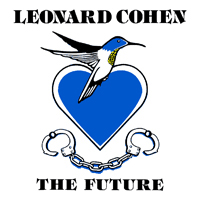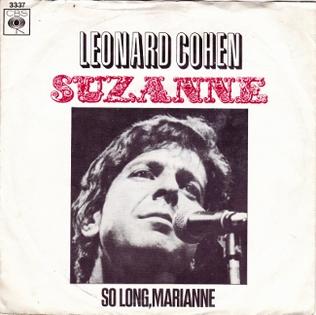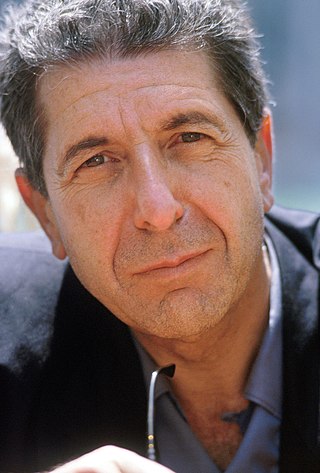Related Research Articles

Patrick Ray Leonard is an American songwriter, keyboardist, film composer, and music producer, best known for his longtime collaboration with Madonna. His work with Madonna includes her albums True Blue (1986), Who's That Girl (1987), Like a Prayer (1989), I'm Breathless (1990) and Ray of Light (1998). He scored Madonna's 2008 documentary I Am Because We Are, played keyboards with her at Live Aid (1985), and was musical director and keyboardist on The Virgin Tour (1985) and the Who's That Girl World Tour (1987).

Songs of Leonard Cohen is the debut album by Canadian singer-songwriter Leonard Cohen, released on December 27, 1967, on Columbia Records. Less successful in the US than in Europe, Songs of Leonard Cohen foreshadowed the kind of chart success Cohen would go on to achieve. It reached number 83 on the Billboard 200. It peaked at number 13 on the UK Albums Chart, spending nearly a year and a half on it.

Kate McGarrigle was a Canadian folk music singer-songwriter, who wrote and performed as a duo with her sister Anna McGarrigle.

The Future is the ninth studio album by the Canadian singer-songwriter Leonard Cohen, released in 1992. Almost an hour in length, it was Cohen's longest album up to that date. Both the fall of the Berlin Wall and the 1992 Los Angeles riots took place while Cohen was writing and recording the album, which expressed his sense of the world's turbulence. The album was recorded with a large cast of musicians and engineers in several different studios; the credits list almost 30 female singers. The album built on the success of Cohen's previous album, I'm Your Man, and garnered overwhelmingly positive reviews. The Future made the Top 40 in the UK album charts, went double platinum in Canada, and sold a quarter of a million copies in the U.S., which had previously been unenthusiastic about Cohen's albums.

Dear Heather is the 11th studio album by Canadian singer-songwriter Leonard Cohen, released by Columbia Records in 2004. It was dedicated "in memory of Jack McClelland 1922-2004."

I'm Your Man is the eighth studio album by Canadian singer Leonard Cohen, released on February 2, 1988 by Columbia Records. The album marked Cohen's further move to a more modern sound, with many songs having a synthesizer-oriented production. It soon became the most successful studio album which Cohen had released in the US, and it reached number one in several European countries, transforming Cohen into a best-selling artist.

Martha Wainwright is a Canadian singer-songwriter and musician. She has released seven critically-acclaimed studio albums.

"Suzanne" is a song written by Canadian poet and musician Leonard Cohen in the 1960s. First published as a poem in 1966, it was recorded as a song by Judy Collins in the same year, and Cohen performed it as his debut single, from his 1967 album Songs of Leonard Cohen. Many other artists have recorded versions, and it has become one of the most covered songs in Cohen's catalogue.

Howard Bilerman is a Canadian musician, sound engineer, and record producer based in Montreal, Quebec. He co-owns the hotel2tango recording studio, and played drums for the band Arcade Fire.

"Hallelujah" is a song written by Canadian singer Leonard Cohen, originally released on his album Various Positions (1984). Achieving little initial success, the song found greater popular acclaim through a new version recorded by John Cale in 1991. Cale's version inspired a 1994 recording by Jeff Buckley that in 2004 was ranked number 259 on Rolling Stone's "The 500 Greatest Songs of All Time".
"Famous Blue Raincoat" is a song by Leonard Cohen. It is the sixth track on his third album, Songs of Love and Hate, released in 1971. The song is written in the form of a letter. The lyric tells the story of a love triangle among the speaker, a woman named Jane, and the male addressee, who is identified only briefly as "my brother, my killer."
"The Partisan" is an anti-fascist anthem about the French Resistance in World War II. The song was composed in 1943 by Russian-born Anna Marly (1917–2006), with lyrics by French Resistance leader Emmanuel d'Astier de La Vigerie (1900–1969), and originally titled "La Complainte du partisan". Marly performed it and other songs on the BBC's French service, through which she and her songs were an inspiration to the Resistance. A number of French artists have recorded and released versions of the song since, but it is better recognised globally in its significantly, both musically and in the meaning of its lyrics, different English adaptation by Hy Zaret (1907–2007), best known as the lyricist of "Unchained Melody".

Lewis Furey, born with the name Lewis Greenblatt, is a Canadian composer, singer, violinist, pianist, actor and director.
Sylvie Simmons is a London-born, California-based music journalist, named as a "principal player" in Paul Gorman's book on the history of the rock music press In Their Own Write. A widely regarded writer and rock historian since the late 1970s, she is one of the few women to be included among the predominantly male rock elite. Simmons is the author of a number of books, including biography and cult fiction. Simmons is also a singer-songwriter, ukulele player and recording artist.

Leonard Norman Cohen was a Canadian singer-songwriter, poet, and novelist. Themes commonly explored throughout his work include faith and mortality, isolation and depression, betrayal and redemption, social and political conflict, and sexual and romantic love, desire, regret, and loss. He was inducted into the Canadian Music Hall of Fame, the Canadian Songwriters Hall of Fame, and the Rock and Roll Hall of Fame. He was invested as a Companion of the Order of Canada, the nation's highest civilian honour. In 2011 he received one of the Prince of Asturias Awards for literature and the ninth Glenn Gould Prize.
The Barr Brothers is an indie folk band founded in Montreal, Quebec in 2006, consisting of two American brothers Andrew and Brad Barr, as well as bassist Morgan Moore, pedal steel guitarist Brett Lanier, and harpist Eveline Gregoire-Rousseau.

Marianne Christine Stang Ihlen was a Norwegian woman who was the first wife of author Axel Jensen and later the muse and girlfriend of Leonard Cohen for several years in the 1960s. She was the subject of Cohen's 1967 song "So Long, Marianne".
Tower of Song: A Memorial Tribute to Leonard Cohen was a concert, which was held at the Bell Centre in Montreal, Quebec on November 6, 2017 as a tribute to singer-songwriter Leonard Cohen marking the first anniversary of his death. The concert, which featured musicians performing Cohen songs, was subsequently broadcast by the Canadian Broadcasting Corporation as a radio and television special, airing on CBC Music on November 7, 2017 and on CBC Television on January 3, 2018.

"Cornelia Street" is a song written and recorded by the American singer-songwriter Taylor Swift for her seventh studio album Lover (2019). She produced it with Jack Antonoff. The title of the song refers to a street in the New York neighborhood Greenwich Village, where Swift had rented a townhouse. Swift stated that "Cornelia Street" was one of the most personal songs on Lover. The song's lyrics are about Swift pleading to never let her love interest go, after having shared the ups and downs during the course of their relationship. The electropop song is instrumented by a flute-like keyboard line, a delicate piano, and a fluttering synthesizer.

Hallelujah: Leonard Cohen, A Journey, A Song is a 2022 feature-length documentary biographical film created by Dan Geller and Dayna Goldfine describing the story of Leonard Cohen, focusing on his song "Hallelujah". The film is based on Alan Light's 2012 book The Holy or the Broken.
References
- 1 2 3 4 Rodriguez, Juan. (2007-04-14). "They're Playing Our Song. From Beau Dommage and Leonard Cohen to Malajube and Ariane Moffatt, singers and songwriters in Montreal and in love with Montreal have always charted the life of our city in music" (pages 1 and 2). Montreal Gazette . Archived from the original (pages 1 and 2) on 2022-04-04. Retrieved 2022-04-04 – via Newspapers.com.
- 1 2 3 4 5 6 7 8 Burnett, Richard (2012-10-27). "Museum ranks All-Time Top 5 songs about Montreal". Montreal Gazette . Archived from the original on 2022-04-04. Retrieved 2022-04-04.
- 1 2 Johnston, David (2009-02-17). "If he comes here, what song should we greet him with?". Montreal Gazette . Archived from the original on 2022-04-04. Retrieved 2022-04-04– via Newspapers.com.
- 1 2 3 4 5 Hudson, Alex (2021-12-24). "The 7 Best Songs Titled "Montreal"". Exclaim! . Archived from the original on 2022-04-04. Retrieved 2022-04-04.
- ↑ Manley, Alex (2019-03-13). "Road to 315: Carey Price is peerless". Eyes On The Prize. SB Nation. Vox Media. Archived from the original on 2022-04-04. Retrieved 2022-04-04.
- ↑ Glinter, Glinter (2019-09-21). "A Happy 85th Birthday To Leonard Cohen". The Forward . Archived from the original on 2022-04-04. Retrieved 2022-04-04.